The Whisper of Reverence
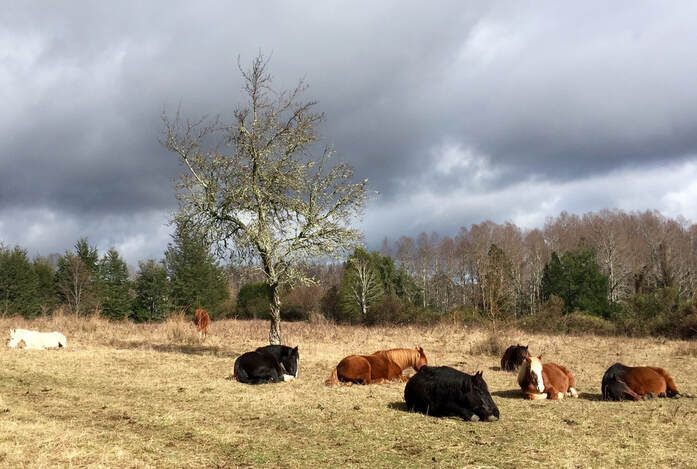
Reverence Found within the Quiet of the Herd
The cold breath of dusk kissed my nose as I felt myself slowly emerging from my dream state. Through my cheek, which lay gently atop an extra fleece bundled into a makeshift pillow, I could feel the weight of the horses’ hooves landing on the soft soil. The herd was close; not only could I feel the slow, soft drumming of their hooves on the land, but the rhythmic sound of their chewing began to fill my ears. I sat up in my sleeping bag and scanned the dark valley before me. As my eyes adjusted, the shapes of seven dark figures emerged.
The herd was grazing alongside me by the time I’d stuffed my bivy and sleeping bag back into my pack and made a steaming cup of tea. Ever-so-slowly, as if gently pulled by some invisible string, the herd moved across the valley. As the sun climbed the mountain behind us, I moved with them, observing the way they meandered, noticing it was not one horse guiding the rest, but instead a fluid exchange of forward(ish) grazing movement in the same general direction.
As we arrived in the middle of the vast field, the horses stopped chewing one or two at a time, and stood quietly in smaller groups. Then, almost suddenly, everything was still. I sat in the middle of them, took a deep breath, closed my eyes and felt the first rays of sunshine splash across my face – immediately invoking perma-grin. Here, we rest in reverence.
Nature loves movement, as do horses, and yet there is always ritualistic space and time for rest and reverence. As humans, we’ve designed most of our societal structures, expectations and spaces in a manner that doesn't invite nor allow for individual, let alone communal, rest. With our Chilean Criollo herd roaming the wilds of Patagonia, Chile, we’re finding our way back to rituals that tend to our essential need for rest, and reclaiming our communal spaces for sharing reverence together.
The Stillness Within All Things
For the last seven years of my life, I’ve lived in slow relationship with this herd of horses here in the south of Chile. By sheer necessity, the seasonal nature of Earth guides the rhythm of our lives together – such a remote place requires daily surrender to the force and flow of Mother Earth. It has been within this state of surrender that I’ve been mentored, by the herd and the land, toward a gentle homecoming to the seasonal nature of my own life – of our lives.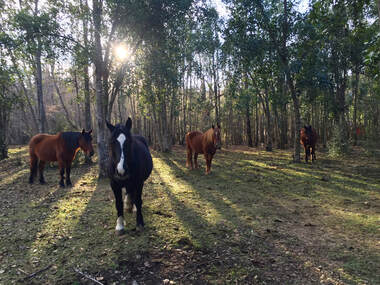 Before moving to Chile, I lived an incredibly fast-paced life in the realms of international business. My career in sustainable business was a far cry from the childhood lived on an organic farm in rural Pennsylvania, where the rhythm of my days was guided by the needs of the horses, the soil and the rest of the always-growing plants and animals. As a child, there was never a need to seek rest, even though we worked hard every day. The animals, the plants, the forest, the creeks and the sky beckoned us with countless invitations to pause, breathe and simply be – and so we did, with ease.
Before moving to Chile, I lived an incredibly fast-paced life in the realms of international business. My career in sustainable business was a far cry from the childhood lived on an organic farm in rural Pennsylvania, where the rhythm of my days was guided by the needs of the horses, the soil and the rest of the always-growing plants and animals. As a child, there was never a need to seek rest, even though we worked hard every day. The animals, the plants, the forest, the creeks and the sky beckoned us with countless invitations to pause, breathe and simply be – and so we did, with ease.
Adulthood tried to reshape the priorities of my youth, and the endless work hours of a corporate lifestyle consumed my spirit and starved my soul. It’s so easy for our lives to become so full of what seems important, that we can no longer hear the beckoning of nature as she calls us back to her day after day. It’s so easy to banish the idea of rest to the confines of a weekend, a good night’s sleep, or a long-awaited vacation, rather than acknowledging it as an elemental source of resilience, and a vital space for soaking in our interrelatedness.
In some ways there is eternal movement in all forms of life and death, because of the constant exchange occurring between and within all organisms. And yet, stillness can always be found in nature.
Returning to Rituals of Reverence
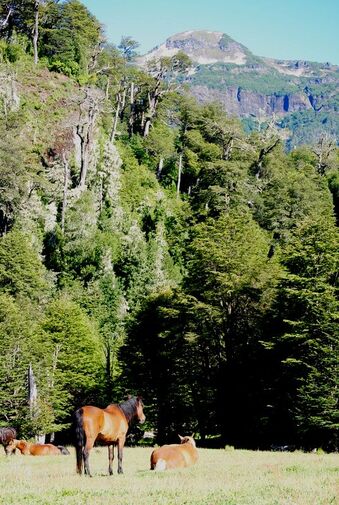 Moving intentionally across landscapes with horses teaches us about rituals of slowness. The intention though, must not be the destination, but instead, the relationality of the process.
Moving intentionally across landscapes with horses teaches us about rituals of slowness. The intention though, must not be the destination, but instead, the relationality of the process.
I’ve walked more than a thousand miles with these horses, and believe me when I tell you nothing slows you down to the rhythm of the Earth, nor to the rhythm of the soul, quite like living and moving slowly with horses as your companions. These journeys are not trail rides ending with a gallop off into the sunset; they are a long, slow, quiet unraveling of ego and self as the needs and the intuitive intelligence of the horses, the Earth, and the soul rise to guide the way.
Reverence has the quality of awe and joy, in that it sneaks up on you and takes hold of your being from a mysterious realm within, the source of which you have no personal control over. Dare I say it cannot be cultivated, only tended to with presence and attention. It lives within these quiet, subtle spaces of rest and stillness; and so, by going there, by being there, we allow it to find us and take hold of us.
Amidst one of these long, slow journeys with the horses, I awoke in the middle of the night with a pull to leave the tent and go find the herd. It was perhaps 3am, and my birthday. As I stepped outside the silvery moonbeams washed over the wide meadow where we had set camp. I walked silently through the bright night air, weaving my way among thinly spread trees, feeling my way toward the horses.
I came upon another clearing and there they were – all seven, standing stock still in a perfect circle, facing inward toward one another. I paused, taken aback, pulling my breath inward as I watched them and felt the connection between the full moon and starry sky above, their silvery still bodies receiving and transmitting, the solid Earth beneath them breathing with us all. The reverence I felt was overwhelming; I almost felt as though I shouldn’t be there, I shouldn’t see what I was seeing, it felt so sacred. And yet, I had been invited there, pulled there even, and so I chose to stay, to breathe and be.
“One of the lovely ways to pray is to take your body out into the landscape and to be still in it.” – John O’Donohue
Allowing Reverence to Take Hold
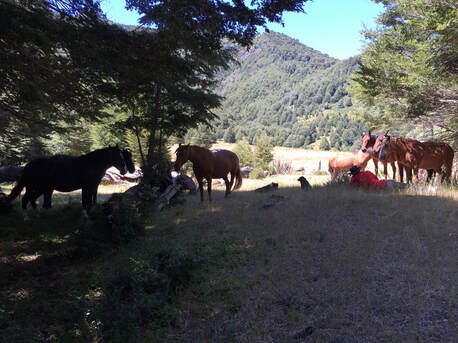 How might we open pathways in our lives so that the natural rhythm of rest may again freely flow in and through our daily existence?
How might we open pathways in our lives so that the natural rhythm of rest may again freely flow in and through our daily existence?
The herd allows this with such ease. The more I follow the pull to go out and be with them, to go out and be with the forest, to be with the river, to be with the wind and the rain and the volcanoes and this wild (and not always so wild) landscape, the more I find myself allowing it with ease as well.
Could it be so simple? That by returning to ourselves and the rhythm of our inner nature, we return to the broader invitation that the Earth is always extending us – this ever-so-nurturing invitation to find rest and stillness within the constant movement of life?
As with so many things, the horses help make this invisible dynamic visible. They help us attune to our deepest callings and to the deeper callings of these larger universal forces. As they do, they invite us in, again and again, to share in these wondrously rich moments of rest, so that a deeply felt reverence for this life, and our shared interrelatedness, can always find its way back to us. ~*~ 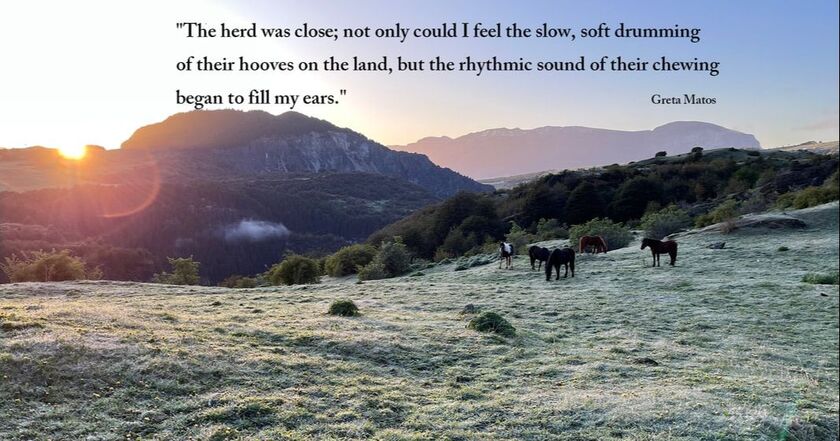
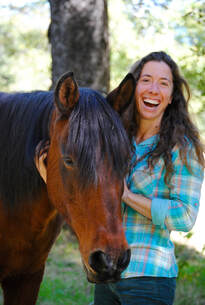 Greta is the Co-Founder of CuraKuda, working at the nexus of reciprocal conservation, regenerative business, and equine-guided experiential learning. Surrounded by active volcanoes, wild rivers, hanging glaciers and 1000+ year-old forests, she and her family live alongside a herd of horses in the South of Chile, where together they roam and relate. Partnering primarily with herds at liberty and in the backcountry, Greta facilitates generative journeys through wild landscapes- both internally and externally. She considers herself to be a “horse listener”, deeply committed to a life of intentional relationship with Earth, Horse and Human. She is a writer, a mother, a soul friend and a dedicated spirit. Greta is based in Patagonia, Chile. You can learn more about her life and work, and are encouraged to reach out directly through a variety of channels including: www.curakuda.com
Greta is the Co-Founder of CuraKuda, working at the nexus of reciprocal conservation, regenerative business, and equine-guided experiential learning. Surrounded by active volcanoes, wild rivers, hanging glaciers and 1000+ year-old forests, she and her family live alongside a herd of horses in the South of Chile, where together they roam and relate. Partnering primarily with herds at liberty and in the backcountry, Greta facilitates generative journeys through wild landscapes- both internally and externally. She considers herself to be a “horse listener”, deeply committed to a life of intentional relationship with Earth, Horse and Human. She is a writer, a mother, a soul friend and a dedicated spirit. Greta is based in Patagonia, Chile. You can learn more about her life and work, and are encouraged to reach out directly through a variety of channels including: www.curakuda.com
SHARE YOUR REFLECTION
3 Past Reflections


On Jun 28, 2024 pat warren wrote:
Thank you very much for sharing your beautiful message.
I am so grateful to have spent my younger moments living on a farm. Listening to you reminds me of the healing found in rest and the blessing to be found in being with nature.
I also cared for thorough-bred horses and if I could read their minds, they would rather be running together, in a field.


On Jun 29, 2024 Deepak Sethi wrote:
Post Your Reply